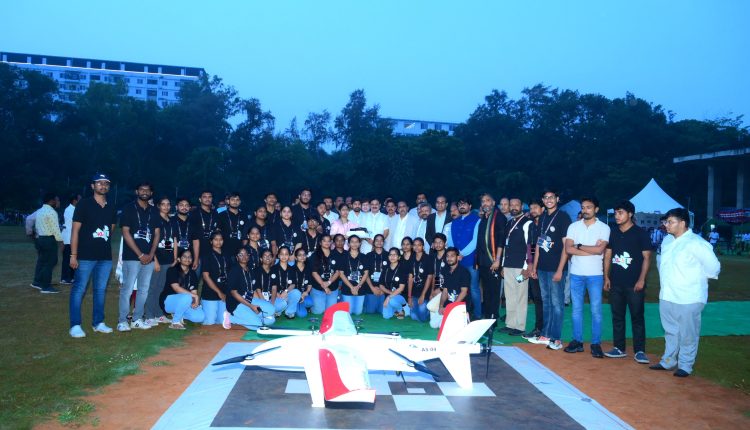KLEF Deemed to be University Achieves Landmark in Student Space Research with Triple Satellite Success
Launches KLSAT-2, CanSat, and KLJAC
Hyderabad: In a historic stride for student-led space innovation and technology demonstration, KL Deemed to be University (KLEF) successfully launched its three student-built satellites — KLSAT-2 (2U CubeSat), KLJAC (Lightweight Pico Balloon Satellite), and CanSat (4U Module) — from its Vaddeswaram Campus, marking a defining moment in the institution’s pursuit of indigenous space technology and research excellence.
Designed under the student satellite project, the initiative was led by the KLSAT Team from the RF & Microwave Centre of Excellence, in collaboration with Andhra Pradesh State Council of Science & Technology (APCOST) and REDWING.
The event was graced by Shri Kanumuru Raghu Rama Krishna Raju Garu, Deputy Speaker, Andhra Pradesh Legislative Assembly; Shri Bhupathi Raju Srinivasa Varma Garu, Union Minister of State for Heavy Industries & Steel; and Shri Koneru Satyanarayana Garu, President and Chancellor, KLEF. Distinguished dignitaries from industry, ASI, and academia, along with researchers, experts, faculty members, and students, also witnessed the event.
Shri Kanumuru Raghu Rama Krishna Raju Garu praised the students’ dedication and creativity, while Shri Bhupathi Raju Srinivasa Varma Garu lauded the university’s initiatives in advancing indigenous technology and nurturing future-ready talent.
Each of the three missions carried distinct objectives and outcomes. KLSAT-2 (2U CubeSat) with Hybrid Aeroswift VTOL Flight-Cum-Flight Module, an upgraded version of the earlier KLSAT-1 (launched in 2023), evolved from a 1U to a 2U CubeSat, enhancing its capability for scientific research, environmental monitoring, spectrometer-based data collection of 18 wavelengths and real-time communication under near-space conditions. The mission, lasting 60 to 90 minutes, focused on environmental data collection and drone-assisted CubeSat deployment — marking a first-of-its-kind experiment by students.
The CanSat module, equipped with a Hybrid Coaxial Tricopter, was the only student satellite from Andhra Pradesh shortlisted for the National-Level CanSat Competition conducted by IN-SPACe, ISRO, and the Astronautical Society of India (ASI). It operated for about 15–20 minutes, demonstrating innovation in CAN satellite design with Atmospheric sensors and a parachute-based recovery system with innovative deployable payload, and is now being adapted for orbital launch in 2026.
The KLJAC satellite, an ultra-light Pico Balloon model roughly the size of a credit card, which remains airborne for about few days to months has travelled 800KMs and stayed at an altitude of 14 KMs. Built entirely by students, it was designed for Tropospheric research and telemetry testing, successfully transmitting real-time atmospheric data such as temperature, pressure, and humidity in the form of a beacon further decoded by the students. It stands among the smallest functional educational satellites ever developed, showcasing KLEF’s leadership in student-driven space missions. A total of 46 dashboard monitoring parameters were developed for live mission tracking.
Er. Koneru Satyanarayana, Chancellor, KL Deemed to be University, congratulated the young achievers, stating, “Our vision has always been to transform education into innovation. This achievement by our students is a proud reflection of that philosophy. When youth are given access to technology, mentorship, and imagination, they can truly reach for the stars. These successful missions stand as a tribute to India’s new generation of innovators.”
A dedicated team of 34 students, guided by Dr. K. Ch Sri Kavya, Mission Director KLSAT, Dr. K. Sarat Kumar, Member Secretary, APCOST, worked tirelessly to make the missions a success — handling every stage from concept and design to launch and recovery.
“Watching our satellite lift off was an emotional moment for all of us. Months of effort, failures, recalibrations, and teamwork finally came alive in those few seconds. This project taught us that innovation is not just about science — it’s about perseverance, coordination, and belief,” said a student who was part of the team.
By successfully executing the mission from concept to flight, KL Deemed to be University has reinforced its position as one of India’s most dynamic institutions driving research and innovation aligned with the national vision of Atmanirbhar Bharat and Viksit Bharat @2047.


